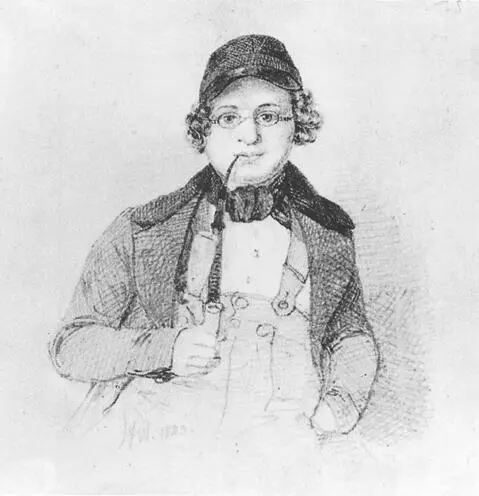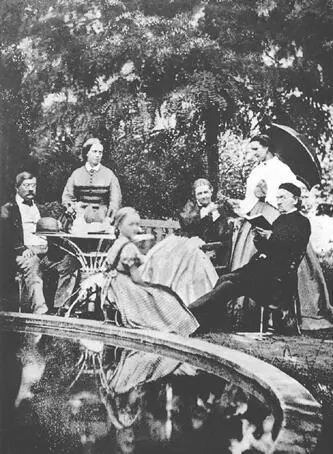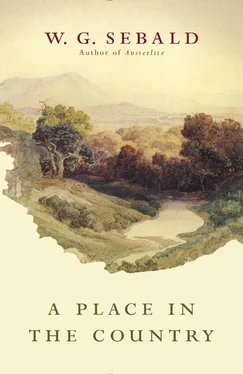
like the twin brother of the Viennese composer. Both were working at the same time, one looking out onto a Swabian apple orchard, the other in Himmelpfortgrund, both attempting a form of composition which seeks to re-create, in a snatch of half-vanished melody, that authentic Volkston which in fact has never existed as such.
So ist mein scheuer Blick,
Den schon die Ferne drängt,
Noch in das Schmerzensglück
Der Abschiedsnacht versenkt.
Dein blaues Auge steht
Ein dunkler See vor mir,
Dein Kuß, dein Hauch umweht
Dein Flüstern mich noch hier.
An deinem Hals begräbt
Sich weinend mein Gesicht,
Und Purpurschwärze webt
Mir vor den Augen dicht.
[Thus, while the distant view
Now claims my timid sight,
It dwells on leaving you:
That bitter joy, last night.
The dark lake of your eye
Still glimmers for me here,
Your kiss endures, your sigh,
Your whisper at my ear.
My weeping face still grieves
As on your breast it lies;
A purple blackness weaves
Its skein across my eyes.]
The mistake we always make as listeners is to imagine that these miracles of composition, language, and music are drawing directly upon their natural heritage, whereas in fact they are the most artificial thing about it. What it takes to produce these effects remains, now as then, an undisclosed mystery. Certainly a rare adeptness at their craft, permitting the most minute adjustments and nuances; and then, or so I imagine, a very long memory and, possibly, a certain unluckiness in love, which appears to have been precisely the lot of those who, like Mörike and Schubert, Keller and Walser, have bequeathed to us some few of the most beautiful lines ever written.
Not for nothing is Mörike’s work haunted by the spirit of the Swiss vagabonde Peregrina, whom at the time the young poet did not dare to stay with and whom he sent on her way “in silence,” as he remorsefully writes, “into the wide gray world.” For this enforced sacrifice of true love for the sake of the conventions of bourgeois society, which is the subject of the “Peregrina” cycle and the echoes of which resonate now here, now there, in his work, Mörike pays for the rest of his life by the fact that he is surrounded by his mother, his sister, her friend his wife, and his daughters, trapped within an allfemale household which is nothing more nor less than a travesty of the matriarchal order to which, at heart, all men long to return. This, it seems to me, is the subject of the Historie der schönen Lau [ Story of the Beautiful Lau ], a water nymph with long flowing hair from the Danube delta exiled to the Blautopf near Ulm, whose body resembles in all ways that of a natural woman save that “between her fingers and toes she has webbing white as blossom and more delicate than the petal of a poppy.” This fairy tale, sprinkled with a number of obscure, almost surreal Swabian dialect words, such as Schachzagel, Bartzefant, Lichtkarz, Habergeis , and Alfanz , has as its matriarchal protagonist Frau Bertha Seysolffin, the stout landlady of the Nonnenhof, the inn at the former convent next to the Blautopf, who “also is a true foster mother to poor traveling journeymen.” In her garden “the great golden pumpkins hang in autumn all the way down the slope to the pool.” Just next door is the monastery, where the men keep their own company. Sometimes it so happens that the abbot comes out for a walk and takes a look to see if the landlady happens to be in her garden. On one such occasion in the story he also surprises her bathing in the Blautopf, greeting her with “such a smacker of a kiss that it echoed off the church tower,” reverberating all around, from the refectory, the stables, the fish house, and the laundry, where it dingdongs back and forth between bucket and tub. Here, clearly, the right people have come together. At any rate one can easily imagine what act is being rung in by the great dingdong Mörike describes, even if, for the sake of decency, he glosses over the main action, noting only that the abbot, alarmed at the noise, rapidly waddled off. The fairy-tale happiness experienced by the two stout folk by the water’s edge in Ulm harks back to a time when men and women were not bound to each other two by two, but merely appeared from time to time on the other’s horizon, rather like the moon, which one doesn’t see all the time either.
The story of the beautiful Lau is, of course, a story within a story, built into another tale about Seppe, a shoemaker’s journeyman apprentice from Stuttgart who one day leaves his hometown and goes “at first,” as it says, “as far as Ulm.” The story revolves around the fact that Seppe mixes up the two pairs of magic shoes given to him by the Hutzelmännlein— the eponymous “cobbler-goblin”—one of which, the narrator reveals, “is blessed and destined for a girl,” with the result that on his journey he has great difficulty in walking. Only when he arrives back home in Stuttgart are the mismatched shoes reunited of their own accord with the feet that they are meant for, one happy pair on his own feet and the other on those of the girl Vrone, so that at the Stuttgart Fastnacht celebrations these two Swabian protégés of the Hutzelmännlein , without any rehearsal, are able to perform acrobatic feats high above the heads of the crowd, so daring that “it was as if they had been tightrope walking all their lives.” All their actions, the narrator relates, “seemed like a lovely web which they wove in time to the music.” “Seppe,” so the story continues, “as he danced did not look at the narrow rope beneath his feet, still less at the people below; he had eyes only for the girl — and when they both met in the middle he took her by the hands, they stood still and gazed fondly upon one another; and he was seen secretly to exchange a word with her. Then he suddenly leapt behind her and, turning their backs to each other, they stepped out in opposite directions. When he reached the crossing rod he stopped, waved his cap in the air, and cried out heartily, ‘Long live all the ladies and gentlemen.’ Then the whole market cried out as one, Vivat! three times, to each in turn. Amid all the noise and confusion and the fanfare of the trumpets, pipes, and drums, Seppe ran across to Vrone, who was standing at the opposite end, caught her in his arms, and kissed her for all the world to see.” In this fantasy of erotic wish fulfillment in the dance of two beings high above the earthly sphere, risen above the abyss in which society cowers, a man who has long since given up on the idea of reciprocal love rather late in life imagines one last time how different things might have been if, at the time, he had run off with the by all accounts unusually beautiful and mysterious vagabonde , Maria Meyer, and pursued a different kind of mountebank career from that of writing — that rather

vicarious vice whose clutches those who have once embarked upon it rarely succeed in escaping. And so we see Mörike at the last sitting in the garden surrounded by his wife’s relations on a hot summer’s day, the only one with a book in his hand, and in the end not very content in his role as a poet, from which — unlike his clerical calling — he can no longer retire. Still he has to torment himself with his novel and other such literary matters. But for years now the work has not really been going anywhere. The painter Friedrich Pecht, in a reminiscence from this time, relates how on several occasions he observed Mörike noting down things which came into his head on special scraps and pieces of paper, only soon afterward to take these notes and “tear them up again into little pieces and bury them in the pockets of his dressing gown.”
Читать дальше














